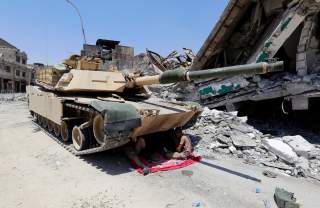After Mosul, Rebuilding Iraq Will Be Just as Painful This Time Around
The fundamental divide between Shia and Sunni seen in the city is characteristic of the unchanged sectarianism throughout the country.
Editor's Note: In our latest Facebook Live interview (please like our Facebook page to see more of these events) Harry Kazianis, Director of Defense studies at the Center for the National Interest, sat down with Lt. Col. Daniel L. Davis (Ret.), a senior fellow at Defense Priorities, to discuss what is next for Iraq
Daniel Davis recently visited Iraq and interviewed residents of Mosul. An excerpt of the article can be found below:
I am currently in Iraq exploring the region in and around Mosul, assessing the current state of the city following Iraqi Prime Minister Haider al-Abadi’s declaration on July 9 that ISIS had been driven from Mosul. Last Thursday I interviewed a number of Mosul residents living in a camp for internally displaced persons (IDPs) outside of Erbil to get their views. What I discovered was a curious combination of hope, numbness and fear for the future. If the Iraqi government isn’t careful, the end of the war against ISIS in Mosul may simply herald a transition to the next phase of conflict.
Just outside of the Kurdish city of Erbil sits Camp Baharka, set up by the Kurdistan Regional Government (KRG) to host IDPs from Mosul and environs. I met with camp manager Meva S. Akrey who shared a bit of the camp’s history and stories from current residents. The camp was established in 2014 as a temporary measure, but has since been upgraded to serve as a long term facility. Currently there are roughly 12,000 people living in the camp, with a total of 250,000 IDPs living throughout the KRG region.
The camp is filled with a combination of Shia and Sunni Muslims, Christians, Yazidis, and other smaller religious subgroups. There has been no problem at the camp with the sectarian conflict or violence that has afflicted other parts of Iraq. Akrey said they have a formal training program that all new families must complete as soon as they arrive. “We emphasize how everyone has to live together, in tolerance. Life here is not about the political or religious issues of the past,” he continued, “but about how they’re going to live in the present and future.” For two years it has worked in the camp. Whether that tolerance remains in effect once IDPs return to their homes, however, remains to be seen.
Akrey said the camp’s population was generally relieved that ISIS has been cleared from the city, but are discouraged by destruction wrought on the city and realization that most won’t be returning to home any time soon.
Interestingly, for the most part, the people don’t blame anyone for their fate. It simply “is.” Whole sections of Mosul have been utterly destroyed in the process of freeing it from ISIS control. The destruction was caused by ISIS, the Iraqi Security Forces (ISF) as they cleared the city section by section, and coalition air attacks, artillery bombardment and drone strikes. Many have become numb and say it doesn’t matter who was responsible: they just want to rebuild and have a chance for a normal life. They do, however, have concerns about what comes next.
Some of the displaced people at Camp Baharka don’t want to go back right away because they want to find out how Mosul is going to be administered first. “Many are afraid there will be a civil war,” Akrey admitted. “They are afraid that if Baghdad comes back in and rules like it did before (the perception of being unfair to the Sunnis, primarily), the people may fight against each other.” There is also the concern about conflicts that might arise between families who fled immediately and those who remained behind.
One elderly camp resident (who wouldn’t give her name because she was still afraid that ISIS might find her) told me there was a commonly held belief that those who didn’t like ISIS left right away, while those that stayed behind did so because they supported ISIS. “I was able to leave,” she explained. “They could have left as well. Why do you think they stayed behind?” A man who lived several blocks over, however, had a different view.
“Many people who escaped had money or cars or knew people outside who could help them. But many did not,” he explained. “Why accuse them of helping ISIS just because they weren’t able to leave?” These diverging views expose some of the dangers looming for post-ISIS Mosul—even aside from how the city is governed.
“Many of the people in this camp who fled Mosul say they know who supported ISIS and who didn’t” in the areas where they lived, Akrey explained. “When they get back I am afraid many will carry out revenge attacks” against their neighbors in vigilante, extrajudicial ways. Shia firebrand cleric Moqtada al-Sadr said he has similar fears.
Image: A tank of Iraqi security forces is seen during fighting between Iraqi forces and Islamic State militants in the Old City of Mosul, Iraq July 6, 2017. REUTERS/Ahmed Saad.

